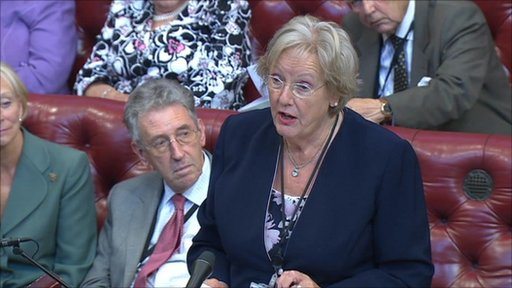
The House of Lords was told today that key clauses in the legislation that would help protect leaseholders’ funds that are controlled by managing agents won’t come into force because this was the Labour government’s policy.
This was the explanation from Baroness Hanham, Under-Secretary of State, Department for Communities and Local Government, why the key Section 156 of the Commonhold and Leasehold Reform Act 2002 would not be introduced.
As soon as Grant Shapps came into office with the coalition government this vital piece of pending legislation was dumped.
Baroness Gardner of Parkes, a Conservative, had demanded to know whether the government would introduce protections after the conviction last month of managing agent Simon van Houten, 31, for stealing £122,000, who faces a jail sentence at the Old Bailey on Thursday.
“Does [Baroness Hanham] not think that the nearly three million leaseholders are entitled to the protection called for by the voluntary accreditation bodies, Leasehold Knowledge Partnership and the Association of Residential Managing Agents, and supported by the British Property Federation?” asked Baroness Parkes, who had provided Baroness Hanham with LKP’s report of Van Houten’s conviction.
The government minister replied that the law provides sufficient protection for leaseholders.
“They are deemed to be held in trust,” said Baroness Hanham. “The law also provides leaseholders with a number of rights to aid transparency over service charges. These include rights to be consulted, to ask for a summary of service charges, and to see supporting documentation. The Government therefore have no plans for additional regulation of leasehold service charges.”
She later added: “There are voluntary regulators and voluntary regulations and organisations that are keeping an eye on this. I am sure my noble friend will agree that it is not always for the law or for Parliament to dictate or regulate and that an industry can be self regulating. That is the situation at present.”
Baroness Hanham repeated: “As I said before, this was not this Government’s legislation ,,. If the previous Government had wished to implement the Act and those clauses, they could have done so. We have not chosen or do not think that it is appropriate to do so.”
This answer prompted Lord Lloyd of Berwick to declare: “An important new principle has just been announced. There are many reasons for not bringing things into force, which Parliament has passed, but surely one is not that the other side passed the legislation. Parliament passed the legislation and the Minister is saying that she does not like it.”
The debate in full
Housing: Leaseholder Deposit Protection
3.01 pm
Asked By Baroness Gardner of Parkes: To ask Her Majesty’s Government whether they will introduce a transparent scheme, similar to the Deposit Protection Scheme for tenants, to protect monies paid by leaseholders and held by managing agents.
Baroness Gardner of Parkes:
My Lords, I beg leave to ask the Question standing in my name on the Order Paper. In doing so, I state that my interest is on the register.
The Parliamentary Under-Secretary of State, Department for Communities and Local Government (Baroness Hanham): My Lords, the law already provides protection for service charges. They are deemed to be held in trust. The law also provides leaseholders with a number of rights to aid transparency over service charges. These include rights to be consulted, to ask for a summary of service charges, and to see supporting documentation. The Government therefore have no plans for additional regulation of leasehold service charges.
Baroness Gardner of Parkes: My Lords, is the Minister aware of the case reported last month of the managing agent who pleaded guilty to stealing £122,000 from leaseholder funds? Does she not think that the nearly 3 million leaseholders are entitled to the protection called for by the voluntary accreditation bodies, Leasehold Knowledge Partnership and the Association of Residential Managing Agents, and supported by the British Property Federation? Can she tell me what parliamentary procedures would be required to introduce regulation?
Baroness Hanham: My Lords, I thank my noble friend for drawing to my attention the article about the offence to which she referred. As it is a matter of court action, I do not think there is anything I can say. The article is not sufficiently detailed to know exactly where the money came from so I do not think I can comment any further on that.
My noble friend will know that if you are going to undertake legislation then before doing so, you must undertake consultation, draw up plans and take the process through, not only the regulators but also the leaseholders and those who are carrying out the voluntary regulation at the moment. You must then find legislative time to deal with it. We do not believe that it is necessary at this stage to undertake any of that.
Baroness Maddock: My Lords, my noble friend will remember the Commonhold and Leasehold Reform Act 2002. We spent many hours on it. My noble friend will also know that Section 156 of the Act, which would have protected leaseholders from losing their funds, has not yet been brought in. Can my noble friend tell me what the Government’s plans are regarding this part of that important Act?
Baroness Hanham: My Lords, the Government have no plans to implement these provisions at present, but we are keeping a watching brief on the concerns of people within the leasehold reform area. A technical guide was published last year by the Institute of Chartered Accountants in England and Wales on accounting and reporting on residential service charges. We would encourage its adoption across the sector.
Lord McKenzie of Luton: My Lords, I draw attention to my interest in the register. The noble Baroness, Lady Gardner of Parkes, has rightly raised the issue of regulating managing agents from the perspective of leaseholders. However, with the private rented sector now at £3.6 million households, and with nearly one-third of all private rented sector households being families with children, is now not the time for effective and comprehensive regulation of the whole sector?
Baroness Hanham: My Lords, as the noble Lord will know, there are two parts to this. This Question is not about the private rented sector. It is about leaseholders. We have no policies at present to bring the private rented sector under the law.
Baroness Scotland of Asthal: My Lords, why have the Government chosen not to make plans to implement legislation that was passed in 2002?
Baroness Hanham: The noble and learned Baroness will be aware that this was not our legislation: it was the legislation of the previous Government and it was the previous Government’s responsibility to implement it.
Baroness Oppenheim-Barnes: Is my noble friend aware that, very often, sinking funds that go missing amount to millions of pounds affecting only about 100 leaseholders? It is not acceptable for this to be allowed to continue under the Act.
Baroness Hanham: My Lords, there are voluntary regulators and voluntary regulations and organisations that are keeping an eye on this. I am sure my noble friend will agree that it is not always for the law or for Parliament to dictate or regulate and that an industry can be self regulating. That is the situation at present.
Lord Hughes of Woodside: Will the Minister please explain, because it was not clear to me from her Answer, what she actually said? If a clause is in statute, is it not obligatory for a Government to take action on it and not say that they are thinking about it?
Baroness Hanham: As I said before, this was not this Government’s legislation. We helped with it and we went through it. In fact, I have been reminded that one of my amendments was agreed by this House in 2001, which is unusual. If the previous Government had wished to implement the Act and those clauses, they could have done so. We have not chosen or do not think that it is appropriate to do so.
Lord Lloyd of Berwick: An important new principle has just been announced. There are many reasons for not bringing things into force, which Parliament has passed, but surely one is not that the other side passed the legislation. Parliament passed the legislation and the Minister is saying that she does not like it.
Baroness Hanham: My Lords, I am saying that this was not this Government’s legislation. The noble and learned Lord is wise enough to know that after a change of Government the new Government will not necessarily take up all the issues or points that have been raised in what has been passed by Parliament.


























